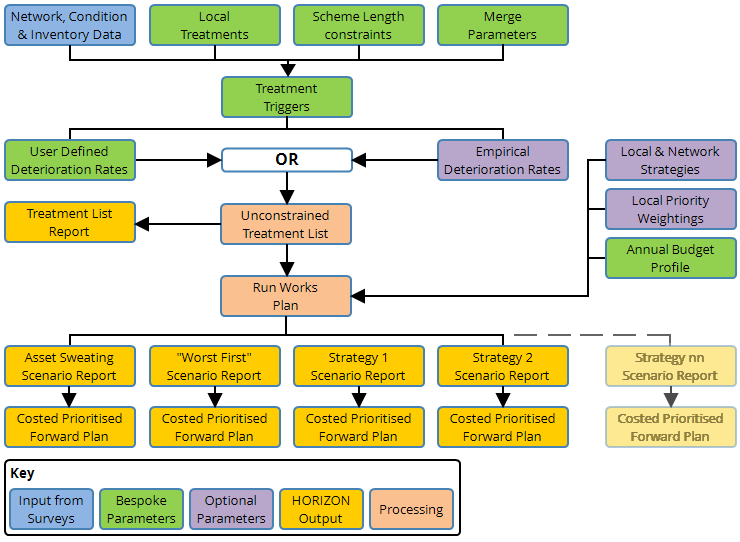Horizons Analysis
Analyse your infrastructure to make data-driven decisions
Use the Analysis module to model potential maintenance schemes for the years ahead. Examine the current condition of your Network assets, calculate deterioration rates from historic data or your own equations, and determine the most effective Treatment(s) for each asset Section that will require attention.
Taking your budgets and strategic targets into account, Horizons can generate informed plans of work that span multiple years, enabling you to make data-driven decisions about the future of your asset maintenance. Apply the right Treatments, to the right places, at the right times!
Some Analysis features may be limited by your licence or only accessible by admin users. See Setting User Permissions in the Management module.
Asset Groups
Organise your Network assets into separate Asset Groups, based on a shared characteristic that predicts similar rates of deterioration, e.g. road class, surface type, traffic load. This makes it possible to optimise condition modelling and Treatment selection for different sets of assets.
Condition Parameters
Determine the condition of your assets. Each Condition Parameter represents an attribute that is periodically measured on assets during physical surveys. Using historical data values, you can define a deterioration curve for each parameter on one or more Asset Groups. This is used to predict the future condition of those assets over time.
Treatments
Define a library of possible treatments. For each Treatment, you can specify its priority, minimum and maximum length, associated costs, and its effects on the Condition Parameters of specific Asset Groups (how it improves an asset's condition).
Treatment Sets
Define hierarchies of possible Treatments, arranged in descending order of severity. Partition the value range of each Condition Parameter into severity bands. Create rules for how Treatments can be triggered on asset subsections, depending on the severity of their Condition Parameter values. Build a Treatment Set to generate an initial list of unconstrained Treatment schemes.
Budgets
Use Budgets to specify the funds available for asset maintenance over a number of financial years. Set an average inflation rate to estimate the budgets of future years. Use Sub-budgets to specify multiple budget amounts for specific Treatments or parts of the Network.
Priorities
Use Priorities to emphasise Treatments in important locations. Use spatially-referenced datasets (e.g. accident rates, flood risks, traffic volumes) to increase the weighting of generated Treatment schemes in certain areas.
Strategies
Set yearly targets and constraints for planned works. This can include budgets, emission limits, condition thresholds and maintenance backlog reduction. In a Works Plan, each selected Strategy influences how potential Treatment schemes are selected or deferred. You can impose a hard budget limit or allow Horizons to go over budget if necessary, so you can see the additional costs of meeting all Strategies.
Works Plans
Bring everything together by generating a multi-year Works Plan. This takes the initial results of a Treatment Set and applies your selected Priorities and Strategies. Multiple scenarios are modelled that take different approaches to asset management, e.g. worst first, asset sweating. Horizons will recommend the cheapest scenario that meets as many Strategy targets as possible. View the result of a Works Plan across a set of formatted Reports, providing detailed breakdowns of each scenario at a Network level and Section level.
You can generate any number of Works Plans, allowing you to test various long-term initiatives based on differing budget profiles and service levels. The Works Plan Reports enable Engineering staff and non-technical stakeholders to engage in meaningful discussion. With everyone having full visibility of the impact of budget decisions on future Network condition, Horizons is a powerful tool for defending or growing a budget!
